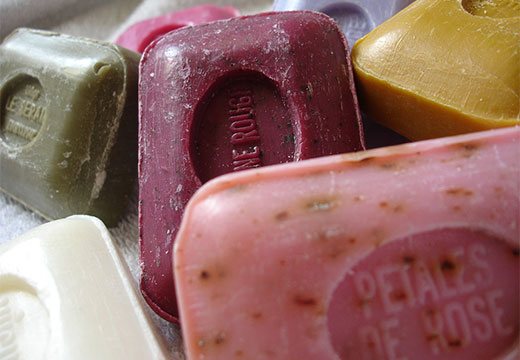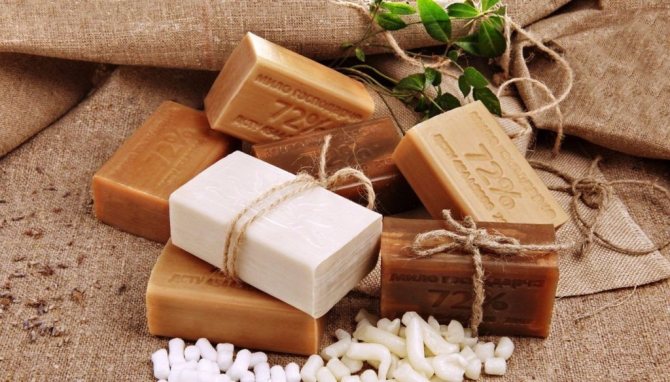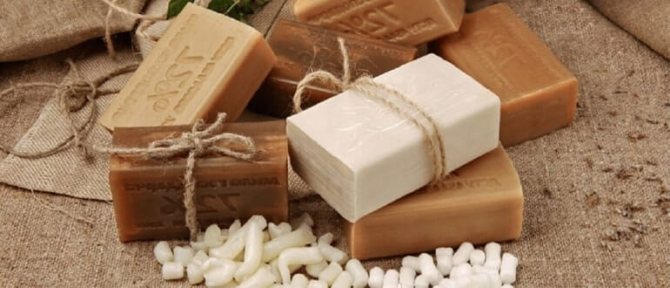Despite the abundance of laxatives in pharmacies, when treating constipation, many people prefer to use folk remedies, such as a bar of soap and a soap enema.
Is it safe to insert soap for constipation, and how to do it correctly so as not to aggravate the problem? Let’s take a closer look.
Operating principle
The effect of soap against constipation is explained quite simply - it irritates the rectum, due to which it begins to work, and stagnant feces come out.
Previously, this method was considered absolutely harmless, but today doctors talk about it as a dubious treatment for constipation:
- On the one hand, soap is actually safer than laxatives, which have side effects and are addictive. Even if the soap suppository remains in the anus, after a while it will dissolve on its own and come out with the stool.
- But there is also a downside - the soap contains alkali, which can cause ulcers and burns on the intestinal mucosa.
Accordingly, a soap enema or soap for constipation should be used very carefully, taking into account all contraindications.
How to make a candle from soap
Using laundry soap for constipation is simple; just cut off a small piece of it and stick it into the rectal cavity. The method has disadvantages:
- prolonged dissolution time;
- angular shape, sharp edges;
- solid structure.
This will weaken the effect and cause inconvenience during administration. An untreated cut will cause physical damage.
To turn the bar into a full-fledged medical product, candles are made.
- Grate it on a fine grater. For one candle - 10-15 grams of shavings.
- Cut a piece of strong wool thread, 5 centimeters long.
- Warm the shavings in your palm and roll them onto a thread.
- Roll until a smooth cylinder comes out, one and a half centimeters long and half a centimeter wide.
- You will get a smaller copy of a feminine hygiene tampon. Make sure the thread hangs freely.
After administration, do not hold the candle for more than 5 minutes. This time is enough for the soap to act on the intestinal mucosa, but not enough for chemical burns to occur.
The soap that melts from body heat will create a lubricant that will help you remove the candle without difficulty. Wait for the result within half an hour.
To soften the effect of the drug on the intestinal walls, gentle suppositories are prepared. Their difference from ordinary candles is that it is made from a decoction that includes soap and other ingredients. This reduces acidity, causticity, and improves the solubility of the drug. Against the background of weakened acids and alkalis, such suppositories do not need to be removed independently and leave the intestines during bowel movements.
- In a steam bath, mix: 50 g of dark laundry soap, 10 g of olive or vaseline oil, half a glass of water.
- Cover with a lid and cook over low heat for two hours.
- At the end of cooking, pour the mixture into a mold to cool. It is better to use silicone ones for baking - it is easier to remove the frozen mass from them.
- After complete cooling, make candles.
Soap suppositories are used no more than once a quarter, so as not to harm the gastrointestinal mucosa. If constipation becomes chronic, it’s time to go to the doctor.

Can it be used for constipation?
Experts recommend using soap instead of an enema only in isolated emergency cases, when a person is sure that the problem is not related to any serious disease.
This method is not recommended for use in the following cases:
- For regular constipation.
- If problems with the intestines are accompanied by nausea, fever, severe abdominal pain, blood and pus in the stool.
- In the presence of ulcers or inflammatory processes in the intestines (irritable bowel syndrome, colitis, etc.).

In all of the above cases, soap as a laxative will not only not alleviate the condition, but can also cause serious complications.
Soap for constipation during pregnancy is not the best remedy, but given that pregnant women have contraindications to the use of most laxatives, sometimes it can be used to alleviate the condition (with all precautions) no more than a few times in 9 months.
Can soap be used for constipation: everything you need to know
In folk medicine, soap for constipation has been used for quite a long time, inserting it into the anus or making an enema solution from it. This method of treating constipation is still widely popular among certain segments of the population, since soap actually has properties that activate peristalsis and intestinal muscles. However, is this type of stool restoration safe? The composition of the soap is rich in alkali and other antimicrobial substances; it kills not only pathogenic, but also beneficial microflora of the intestinal mucosa.
The effect of soap on the intestines and peristalsis
Soap for constipation in adults began to be used back in Soviet times. This method was widely popular among people of different age categories, and exclusively laundry soap was used for these purposes.
People were sure that soap treatment was not only effective, but also completely safe, because manufacturers actively disseminated information about the naturalness of the product and the absence of any dangerous chemicals in it. Modern medicine has dispelled this myth, and today most doctors are against soap therapy for problematic bowel movements, especially those of a chronic nature.
It is recommended to resort to restoring bowel movements with soap if the cause of the disease is:
- error in nutrition;
- not drinking enough;
- sedentary lifestyle;
- taking certain medications;
- decreased intestinal motor function and peristalsis.
Soap for constipation acts similarly to fast-acting laxatives. Once in the intestinal cavity, it is evenly distributed along the walls and irritates the mucous membrane. Alkali activates smooth muscles and stimulates peristalsis, which causes the release of accumulated feces within 15–20 minutes after use.
The act of defecation when using soap is easy and painless. The product, heating up from body temperature, softens and envelops feces, making them soft and slippery. A person does not even have to push to have a bowel movement. Therefore, unlike irritating laxatives, treating constipation with soap does not provoke the formation of anal fissures. But, despite this, you should never use soap for constipation in newborns.
How to choose the right soap for constipation
Not all soap products are suitable for restoring natural bowel movements. So, laundry soap for constipation . Its composition does not contain dyes or synthetic substances that can cause an allergic reaction. In addition, this soap is natural, as it is made from plant and animal fatty acids and sodium alkali.
When buying laundry soap to relieve constipation, you should pay attention to the percentage of acids it contains. It is better to give preference to 65% soap. It contains less alkali, which means its effect is milder.
As for toilet soap, it is absolutely not suitable for treating constipation. The same applies to tar and bath products. The point is their composition, which is filled not only with fats and alkali, but also with flavors, dyes and other additives.
The use of cosmetic soap provokes drying out of the intestinal walls, and also causes the formation of anal and intestinal fissures.

Features of using soap for bad stools
Soap is used in two ways to cleanse the intestines of accumulated fecal matter:
- make suppositories from the product for rectal administration;
- prepare an enema solution.
Before resorting to one of them, you should make sure that constipation arose as an independent disease, and not as a symptom of something more serious. Self-medication with soap therapy is strictly prohibited if bad stool or its complete absence is accompanied by the following additional symptoms:
- increased gas formation;
- nausea;
- loss of appetite;
- abdominal pain;
- heaviness in the intestinal area;
- temperature increase.
Do not use soap for constipation in case of changes in stool. If, during partial emptying, pea-shaped feces are released or the consistency of the stool resembles plasticine, the disease can be treated after diagnosis by a specialist. The same applies to the presence of blood and mucus in excrement.
Soap candle for constipation
To make such a suppository, it is best to use dark laundry soap. It is more quickly influenced by body temperature, so the effect occurs after 10–15 minutes. A piece of soap for constipation should correspond to the size of pharmaceutical rectal suppositories and have a diameter of no more than 5 mm. A large piece will cause a burn to the intestinal mucous membranes.
To make the simplest candle, it is enough to take ordinary laundry soap, but you should understand that the method is characterized by an aggressive effect. A suitable piece can either be planed from a block yourself, or formed from soap shavings. The output should be a candle weighing 10 g.
Recommendations for using the candle:
- It is better to make a candle from shavings, since you can roll a thread into it. It helps to remove a piece from the anus after 5 minutes, preventing chemical burns.
- You should not wait for the soap to completely dissolve; just hold it in the lower intestine for 5–7 minutes.
- There is no need to push the candle deep.
- If a burning sensation is felt after the introduction of soap, it should be removed immediately.
- Before use, the piece must be warmed in your palm.
- You should not resort to using soap during constipation more than twice a week.
To reduce the harmful effects of alkali and acids on the intestines, soap for making a suitable piece is boiled independently. It is enough to take 50 g of grated product, mix it with olive or vaseline oil and 100 ml of water. Cook the ingredients in a water bath for about 2 hours with the lid closed. Then cool and put in the refrigerator to harden completely. When everything is ready, make candles according to the above recipe.
Enema solution
Soap in the butt for constipation can be administered not only in the form of suppositories. It is also used to make an enema solution, for which it is better to use baby soap. However, its concentration should be small.
Making the solution is quite simple: add 20 grams of soap shavings to 50 ml of boiled, but not hot, water. After dissolving, take the liquid into a container, lubricate the tip with oil or Vaseline and carefully insert it into the back hole. The mixture should be poured gradually, lying on your side.
Soap-based microenemas help soften accumulated feces and activate the intestinal muscles. However, for their manufacture it is important to select the right product and not increase the permissible chip rate.
Who should not use soap for constipation?
Cleansing the intestines with soap is not recommended for chronic constipation and constipation for more than three days. Frequently recurring problems with bowel movements can be a sign of a serious illness, so it is better to restore stool under the supervision of a specialist.
You should not resort to soap therapy for constipation caused by:
- endocrine disorders;
- diseases of the gastrointestinal tract;
- mechanical damage to the intestines;
- neurogenic problems;
- in case of intoxication of the body;
- in case of neoplasms;
- in the presence of hemorrhoids, etc.
It is strictly forbidden to use soap if a child, especially an infant, is constipated. It is important to understand that children's intestines are more delicate than adults, so it is quite difficult to calculate the safe amount of soap. Incorrectly treating constipation with soap in a child can result in burns, ulcers and dysbacteriosis.
Can pregnant women use soap for constipation ? Difficulties with bowel movements during pregnancy often worry women. It's all about the restructuring of hormonal levels and the squeezing of intestinal vessels by the growing uterus.
Some people believe that using soap to restore stool in an interesting position is safe. But the opinion of gynecologists on this matter is ambiguous. Some say that if a woman uses soap candles 2-3 times in 9 months, nothing bad will happen. The main thing is to do the procedure according to the rules and use baby soap. Others do not recommend using this product for such purposes.
In the early stages of pregnancy, soap suppositories can cause spontaneous miscarriage, and in later stages, premature birth. Read more information about such a delicate illness on zapora.net.
What soap should I use?
If you have problems with bowel movements due to constipation, it is recommended to use 2 types of soap - laundry and baby soap. They are natural products that do not contain foreign impurities that can cause intestinal problems.
Do not use tar soap or ordinary cosmetics as a laxative, even if the manufacturer claims that it has a moisturizing effect. Contrary to such statements, it dehydrates the mucous membrane, which can lead to the formation of cracks.
Regular toilet soap can cause a condition called tenesmus - a false urge to empty the bowel, which is caused by irritation of the nerve plexuses.
Candles made from laundry soap act faster, but they can only be used in adults - in newborns, laundry soap as a laxative can cause intestinal problems due to the large amount of alkali.
Contraindications and warnings, possible risks
It is worth noting that the use of soap for constipation in an adult can be used as an additional method, preferably a single use. If you neglect this rule, there will be a risk of burns to the intestinal mucosa, which can cause ulcers.
The use of soap for constipation in children is undesirable, especially in newborns.
The risk of severe adverse reactions is very high, so it is better to resort to medications.
Soap contains alkaline compounds that can remain on organ tissues. These substances will contribute to the erosion of the mucous membrane, and they also have an irritating effect on its nerve endings .
If this process is repeated regularly, the patient is at risk of developing tenesmus - a painful urge to defecate.
The use of soap bars for constipation in an adult causes an intestinal response in which it seeks to empty the contents located in its lumen. The stool softens, making it easier to leave the body.
Soap for newborns
Soap for constipation in a newborn is a subject of constant discussion among parents and pediatricians. Constipation in infants is a common problem faced by most parents.

In this case, many mothers prefer to use soap: laxatives are harmful to the child’s body, and most drugs are not recommended for use in children.
But precisely because of the sensitivity of infants to various kinds of irritants and chemicals, soap for constipation should be used in a child under one year of age very carefully and in extreme cases when other methods (massage of the tummy, flexion-extension of the legs) do not give the desired result.
Instructions on how to insert soap into a newborn:
- To properly supply soap to a child, you need to buy a hypoallergenic children's product (you cannot use laundry soap) and cut a piece of soap the thickness of a match.
- Smooth out the sharp edges, then place the baby on his side and carefully insert the candle into the anus several times.
- You cannot insert soap deeply into the anus or leave it there - a few strokes along the anus will be enough for normal bowel movements.
- You should not use this method regularly for constipation in children, otherwise the intestines will get used to the procedure and its functioning will be disrupted.
It is better to discuss the problem of frequent problems with bowel movements in infants with a pediatrician, who will select the necessary treatment method, and also consider the mother’s diet or replace the milk formula.
Is it possible to do a soap enema?
A soap enema is a safer method than soap suppositories for constipation, since the alkali in this case dissolves in water and does not come into contact with the intestinal walls.
The rules for using different types of product are the same as for the “soap in the rectum” method: adults will use an enema with laundry soap or children’s soap, for children – only the second option.
A soap enema is performed as follows: dissolve a small piece of soap in water and perform the procedure in the usual way.
As a conclusion, it must be said that soap for constipation can quickly and effectively relieve the condition in cases where constipation is a temporary isolated phenomenon in a healthy person.
If you experience regular constipation, you should consult a doctor to find out and eliminate the cause of poor bowel function.










